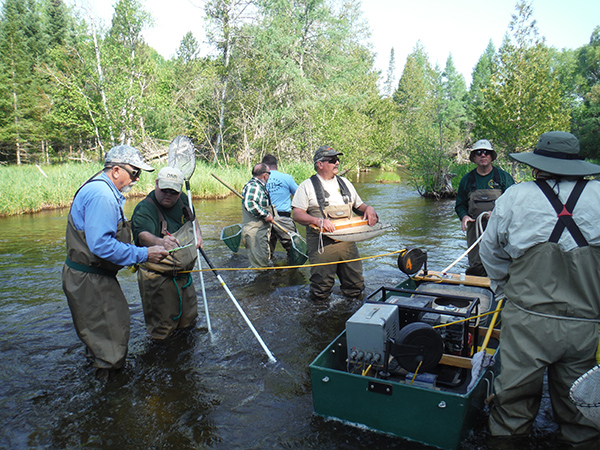- Details
MDNR Report
 DNR Director Daniel EichingerGov. Gretchen Whitmer recently announced appointments for several state agencies, including Daniel Eichinger, who joins the DNR as the department's new director.
DNR Director Daniel EichingerGov. Gretchen Whitmer recently announced appointments for several state agencies, including Daniel Eichinger, who joins the DNR as the department's new director.
Eichinger most recently served as executive director of Michigan United Conservation Clubs, the nation’s most effective state-based conservation organization. In that role, he led MUCC’s return as a driving force for conservation and our outdoor heritage. Under his leadership, MUCC revamped its organizational structure, grew membership and launched new programs to connect people with nature.
From 2007 to 2012, he worked in various capacities with the Department of Natural Resources, first as legislative liaison, where he was heavily involved in passing the innovative Recreation Passport to fund state parks. Later, he helped establish the first Policy and Regulations Unit for the agency’s Wildlife Division.
Gov. Whitmer called Eichinger "a trusted leader in the conservation of Michigan’s abundant natural resources and outdoor heritage" and someone who "has the broad experience needed to bring innovative ideas and also successful implementation of conservation efforts and recreation opportunities here in the state.”
Eichinger, who holds bachelor’s and master's degrees in fisheries and wildlife from Michigan State University, as well as a master’s of public administration, is eager to get started in this new role.
“Conservation is a team sport," he said. "I look forward to working with our partners to continue the thoughtful stewardship of the extraordinary natural and cultural resources that so deeply define us as Michiganders.”
- Details
By Louie Stout
Kudos to Michigan legislators for passing a law that prohibits the Michigan DNR from issuing any more game sterilization permits to cities.
It’s hard to imagine such a bill is necessary, but the DNR gave Ann Arbor such a permit a few years back that allowed the city to sterilize whitetail deer.
The new legislation put a moratorium on the practice until April 1 2022, giving the state time to study the effectiveness of the Ann Arbor project and find “more suitable ways” to manage urban deer herds.
- Details
MDNR Report
 What Happened to the Au Sable North Branch Trout Population?
What Happened to the Au Sable North Branch Trout Population?
When last winter finally relented, and anglers were able to get out and enjoy fishing their favorite spots, the DNR Fisheries Division’s Northern Lake Huron Management Unit started getting phone calls from concerned anglers about their lack of success on the North Branch of the Au Sable River.
The unit receives “there are no fish in my lake” calls on a regular basis, and usually they are based on an angler’s couple of days of poor fishing. This year on the North Branch, however, staff received calls from professional trout fishing guides who had never complained about the fishing before. They told local staff they were experiencing extremely low catch rates and weren’t seeing the feeding activity they normally would during insect hatches.
The North Branch was scheduled for Fisheries Division to conduct population estimates in the late summer at three different sites. However, with the number of anglers reporting startlingly low catch rates of trout, the division decided to conduct electrofishing spot checks on May 30.
- Details
MDNR Report
Two new counties likely will be added to the list of Michigan counties where chronic wasting disease has been found. CWD is a fatal neurological disease that affects white-tailed deer, mule deer, elk and moose.
A 4-year-old hunter-harvested buck in Pine River Township (Gratiot County) and a 2-year-old hunter-harvested buck in Carmel Township (Eaton County) are suspected positive for the disease. The samples were sent to the National Veterinary Services Laboratory in Ames, Iowa, for confirmation.
Chronic wasting disease currently has been confirmed in Clinton, Dickinson, Ingham, Ionia, Jackson, Kent and Montcalm counties.
- Details
MDNR Report
A 4-year-old doe killed on a deer damage shooting permit in Dickinson County's Waucedah Township has tested positive for chronic wasting disease, marking the first confirmation of the incurable deer disease within Michigan's Upper Peninsula.
The finding was verified by Michigan State University's Veterinary Diagnostic Laboratory in East Lansing and the U.S. Department of Agriculture's National Veterinary Services Laboratory in Ames, Iowa.
The deer was shot on an agricultural farm about 4 miles from the Michigan-Wisconsin border.
"We remain committed to maintaining healthy Michigan wildlife for the residents of, and visitors to, this great state, now and into the future," said Michigan Department of Natural Resources Director Keith Creagh. "Fortunately, over the past few years, with the help of hunters, the U.P. CWD Task Force, DNR staffers and others, we are far better prepared to respond to threats posed by chronic wasting disease in the U.P."


